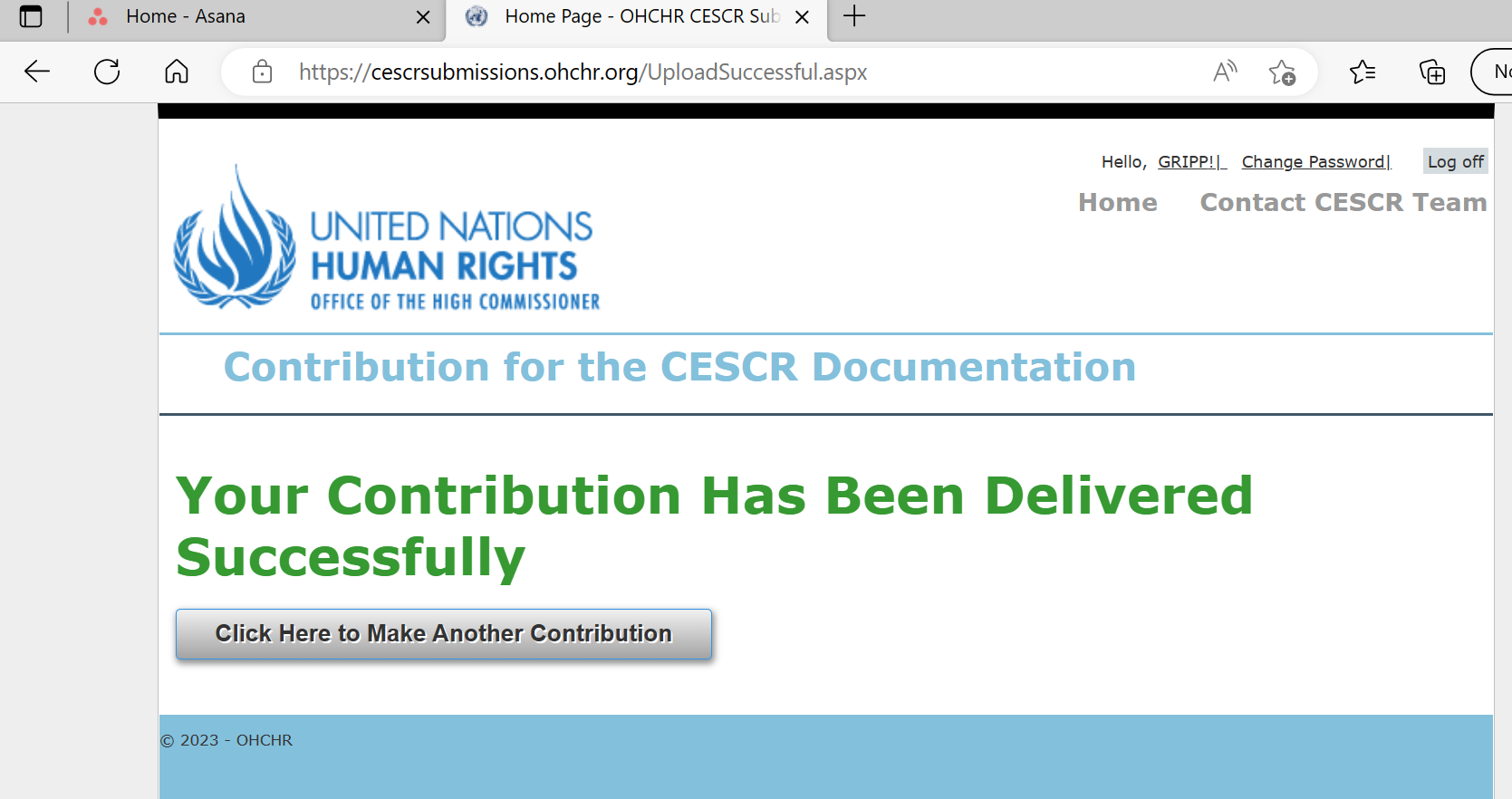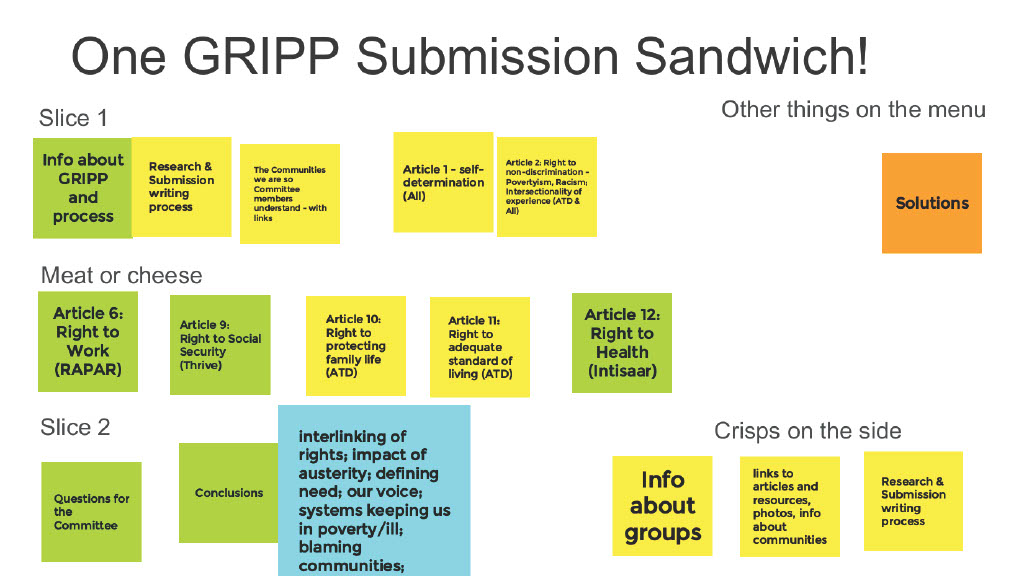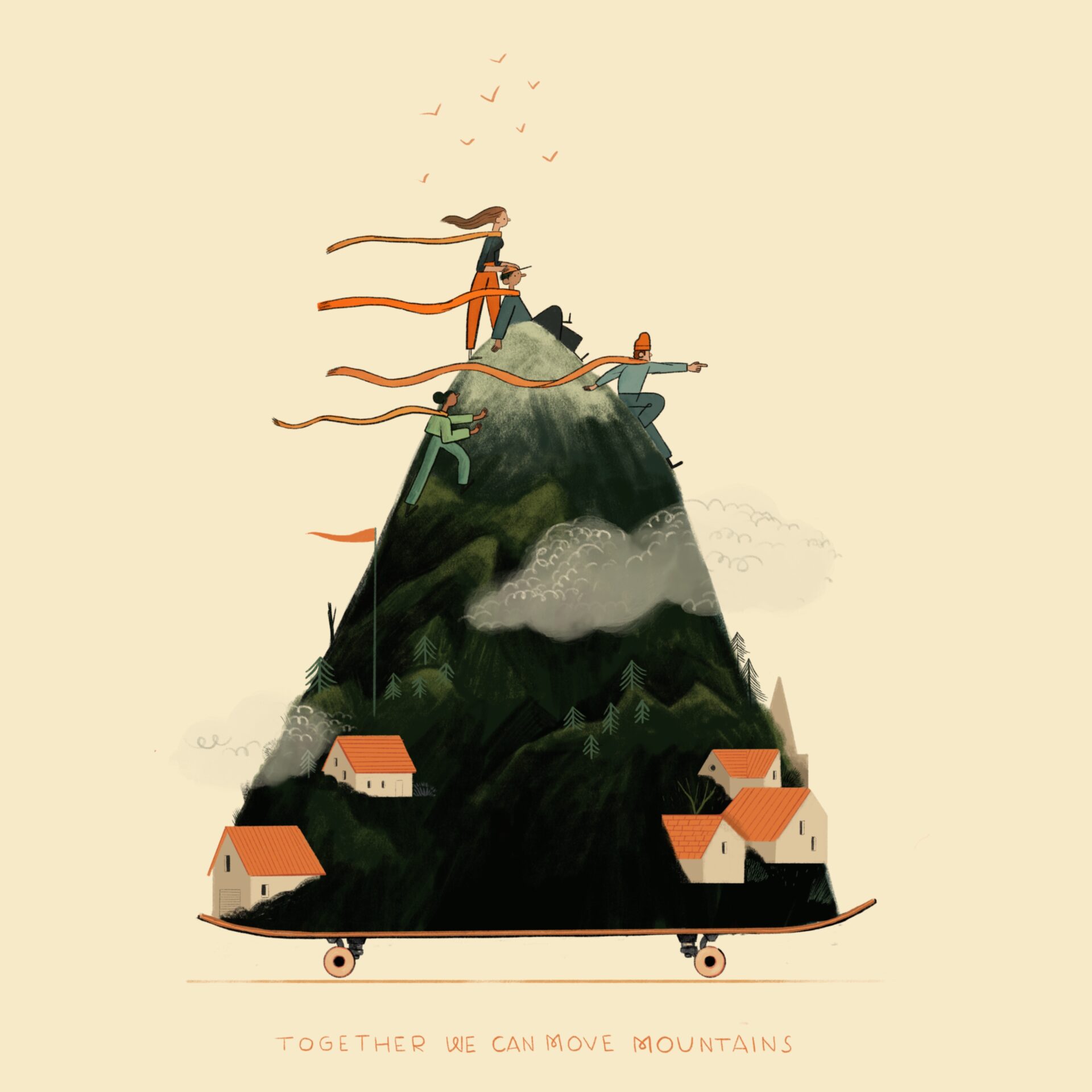Climbing the Mountain: GRIPP’s first submission to the United Nations
Written collectively by GRIPP members.
At GRIPP’s first residential back in October 2022, we agreed that we would work on a joint submission to the United Nations Committee on Economic Social and Cultural Rights’ (CESCR). This submission would be led by ATD Fourth World UK, Intisaar, RAPAR and Thrive Teesside (read more on the residential and the review process here). Now we just had to do it. And we had about 2 months in which to do it…
So, from October to December 2022, we were hard at work using our skills as grassroots researchers, policy researchers and facilitators to pull the submission together for the early January 2023 deadline for the submission. Some of us weren’t sure if this could be done in such a short timescale…
But we did it! And you can see our submission available here on the Office of the High Commissioner on Human Rights website. Wow!

The submission is stands out from most others because it was written and researched by people with direct experience of poverty and economic, social and cultural rights (ESCR) violations. To complete such a report, we took a unique approach to the process of writing the submission.
Our writing process:
Working alongside our writing process, we established an Action Learning Set that would meet every three weeks, comprising of 8 grassroots activists (from ATD, Intisaar, RAPAR and Thrive Teesside) and facilitated by Dr Rhetta Moran. These sets were challenging, but their value went beyond bringing together the report itself, they created a space where members could build trust as a group and support each other as individuals, where they could share their questions and their solutions.
Alongside this we had a second overlapping team working to make the decisions about our submission content and coordinating the research and writing. Led by 4 activists from ATD, Intisaar, RAPAR and Thrive Teesside, facilitated by GRIPP’s project coordinator Susanna Darch, and supported by partners at Amnesty UK and Just Fair, we met fortnightly over zoom, to reflect on the knowledge we had from near 100 years collective experience of activism in our communities, explored how it related to ICESCR and we made a sandwich!?!

Once we had our first draft, allies at University of Essex Human Rights Centre and ESCR team at Amnesty International, gave us some feedback which we then discussed as a team. We had some challenging conversations about what to incorporate – how to ensure the high quality of the report and ensure that it remained true to and spoke to our communities’ experience. Our communities have remained our primary audience throughout this work.
How we felt about working this way:
A member of GRIPP said, “everyone was so open to collaborative approach – really listening to each other and thinking about how we do it with the right values at the core.”
Others also said that “it was great to be part of true collaboration in practise. I found this a refreshing opportunity to talk about our lived reality in relation to the right to social security in a way that made sense to us and in a way that we were comfortable with – through poetry. The words we used were authentic and true and described in detail the truth of our experiences as a direct consequence of harsh policy interventions. It was an energising approach and gave focus to the necessary changes needed.”
As well as pointing out the collaborative nature of these sessions, we buzzed with the creative and friendly atmosphere of these groups, stating that they were “surprisingly exciting and energising! More creative that I had expected. There was quite a bit of laughter!”
We really have enjoyed the whole collaborative and unique process of GRIPP, with members stating “I like the way we’ve worked for the whole of GRIPP. I’ve liked doing the whole process and I still want to keep doing it. I’m really proud of all the work that’s been done before leading up till now.”
What we found challenging
Although the sessions were a space where we could all feel supported and work in an effective collaborative way, we still faced some struggles with our writing process. From the offset, “time was tight” due to starting work in October 2022 and our deadline being early January 2023. With things like “life, work, and everything else getting in the way!”, the deadline was tough but it did “keep us focused”.

What we are most proud of:
With time being against us at times the project felt like a mountain that we couldn’t scale. However, we reminded ourselves that this work of achieving what seemed impossible is exactly what we day after day in our lives, so “some people saying in November that we couldn’t do it in that timescale… we did! Because we’ve been doing it for decades!”
Not only did we complete the report, but we delivered one that was unique and felt authentic, we also did it from “the bottom up, and wasn’t an extractive process, placing ownership with the grassroot groups.”
We were also determined to not get “scared of it being a submission to a United Nations Committee, or be intimidated by what we might worry ‘it should be’, and hold true to our approach, communities and legitimacy of our knowledge.”
We made sure that we knew the work was of the highest quality and backed up with evidence, but without sacrificing the accessibility of the language we used and ensuring we didn’t, “undermine the ‘lived knowledge’ as evidence in and of itself” by over-referencing external resources thereby taking the attention away from our communities’ voices.
This was the first time a lot of members of GRIPP had done work like this, yet this is partly why our submission is unique and important. The result of all of this means that our report “doesn’t read like other civil society reports”.
We are also so proud of what we have achieved as GRIPP in bringing policy and grassroots organisations, and people with lived and learnt experience, together. Speaking about the work done under the submission, one member of GRIPP said, “It felt led by grassroots groups… I felt the bigger orgs genuinely lent their power & solidarity to the 4 groups to then utilise that. They didn’t edit, lead or control content.”
On this point, we also think that “It’s a better way of working. It’s not a tick box exercise – we respect each other’s values and have a compatible working relationship. We like to strive to get more work done as part of the group.”
In the same vein, another member of GRIPP also said that “working with others to complete this submission as part of the wider GRIPP movement ensured a genuine feeling of teamwork, mutual support and solidarity… together we were stronger and were able to pool our ideas and areas of expertise.” Others also recalled a point made by one of our partners from a larger institution, when they said with a big smile, “[As a traditional human rights NGO] we couldn’t write this, but you can.”
What we hope will come from our submission:
The next stage of our engagement with the review will be to meet virtually with members of the Committee on Economic, Social and Cultural Rights on the 8 March 2023, encouraging Committee members to include the issues raised in our submission as issues they look into further at the next stage of the review. We are “hoping that our submission makes a difference to the way people are being treated.” “By law, the UK Government need to know what their policies are doing to people. They need to be held accountable as anyone else would be when breaking the law”
We also hope that the Committee pays particular attention to the emphasis we have placed on the voices and experience of those with lived experience of poverty and economic, social and cultural rights violations.
Alongside the review, we are also starting some campaigning work of the back off our submission which includes engaging with communities directly involved in our research, and people that experience the human rights violations we raised, so that there is community ownership of the report and increased understanding of violations of human rights within our communities.
Follow us on Twitter @GRIPPUK to stay up to date with further news about this work!
Our submission is available on the our Resources page here
